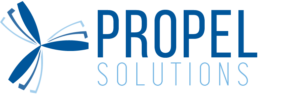The Challenge
The Port of Vancouver, managed by the Vancouver Fraser Port Authority (VFPA), is Canada’s largest port and a dynamic gateway for domestic and international trade that serves as a major economic force for the Canadian economy. In order to fulfill its vision for the Port of Vancouver to become the world’s most sustainable port, the VFPA seeks to continually improve its workplace, processes, and culture to support its employees in reaching organizational goals. Following successful past engagements with the VFPA, Propel Solutions was re-engaged to develop an adoption framework for the VFPA’s Continuous Improvement (CI) Community of Practice to enable organizational-wide adoption of a Culture of Continuous Improvement. The purpose of the engagement was to review and stratify the existing CI Toolkit into CI knowledge levels that meet those of the Community of Practice team members and create an enablement framework to allow members to grow their learning.
The Objectives
Establish CI Community of Practice Stakeholder Tiers: Propel began the engagement with conducting a stakeholder analysis to establish the levels of stakeholders who would be joining the Community of Practice (CoP). CI Knowledge levels were categorized into Novice, Competent, and Proficient. Propel then conducted a needs analysis tailored to each stakeholder level to identify requirements for the stakeholder to move through phases of CI adoption – from mechanical compliance to comprehension to adoption. Furthermore, a comprehensive self-assessment tool was developed for stakeholders to determine where they fit in the three knowledge levels. Assessing district culture and readiness of practitioners at all levels of the system is an important first step to embracing a culture of Continuous Improvement.
Create an Enablement Framework for Community of Practice Stakeholders: Propel identified CI tools that needed to be adopted/adapted within each level of stakeholder tier as well as gaps in the current toolkit. Additional CI activities and best practices were recommended to engage team members into adopting the CoP, including CI awareness-building activities tailored to each audience, interactive workshops, publicized recognition, and guidelines on how to disseminate information effectively using the Prosci ADKAR Change Management Model. As team dynamics greatly influence results, Propel identified CoP roles (CoP team leaders, members, and facilitators) and stages of team development (Forming, Storming, Norming and Performing) in order to guide the VFPA through establishing CoP team membership. Understanding the key roles and responsibilities within the CoP was critical as this would allow for the involvement of CoP members to participate in the improvement efforts in their chosen role.
The Results
As a result, Propel delivered a comprehensive 16-page CI Community of Practice Adoption Framework that served to lay the foundation for the diverse stakeholder groups within the VFPA that would be joining the CoP with a variety of knowledge levels regarding CI and history of implementing improvements. The guidebook addressed both the technical aspects of CI – tied to building technical knowledge and skills, as well as the adaptive qualities of CI, which relate to developing individual and collective habits of mind and practice. The theory of change highlighted throughout the guidebook asserted that establishing norms, routines, and habits of mind and practice would lead to transformational change at the VFPA.

